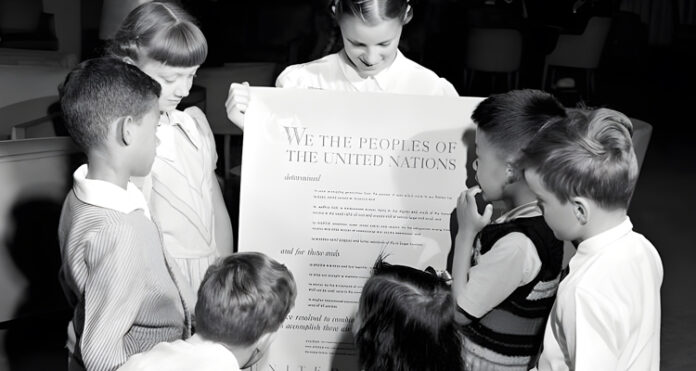From the Archives
This editorial was published in the October 24, 1948, edition of The Living Church.
This Sunday, October 24th, is to be observed throughout the world as United Nations Day. We hope that many of our own churches will give some measure of recognition to the United Nations on this occasion.
While the representatives of the United Nations are struggling in Paris with the vital problems of Berlin and Palestine, with the peace of the world hanging in the balance, it is fitting that people of goodwill in every land should pledge anew their support for the ideals and principles for which the United Nations stands. Secretary [of State George C.] Marshall has described this day as one on which “to re-read the charter, refresh our memories as to its terms, and renew our determination to prevent the recurrence of the tragedy of war by adherence to its principles.”
The slogan for the observance is “Peace Takes Practice.” The organization of the United Nations was not intended to bear, in its early years, the strain of such a dispute as is been referred to it in the split between the great powers of the East and West. It was assumed that the peace settlement with Germany and Japan, and the immediate issues growing out of the war, would be settled by treaties agreed upon amicably by the victor nations; and that the United Nations could take up its work from that point. Instead there has been thrust upon it in its infancy problems of the greatest weight that the nations have been unable to solve through other channels, and with which the U.N. is hardly prepared to cope. It is a tribute to the strength of the U.N. that these problems have not disrupted either the Security Council or the General Assembly, which are striving valiantly to deal with them.
Meanwhile, it is easy to overlook the genuine progress being made by the United Nations in other fields, and through us other agencies the world ordered a message set forth by the Federal Council of Churches that summarizes some of the ways in which the U.N. is trying with growing success to bring a measure of order to a chaotic world.
The Economic and Social Council has launched a far-reaching program to alleviate economic ills. The cooperation of governments and private agencies is being sought to raise the standard of living and to promote the health, welfare, and security of the peoples of the world. The Trusteeship Council, relying solely on the appeal of justice and the power of public opinion, is winning unprecedented response for member states in its efforts to improve the conditions of non-self-governing peoples. An international declaration on human rights has been drafted which seeks to define man’s rights and freedoms, including religious liberty. There is being negotiated a convention against genocide, or the deliberate and systematic destruction of racial, religious, and national minorities. Never before in history of such far-reaching international efforts been projected to advance and safeguard the well-being of humans. Specialized agencies such as the United Nations Educational, Scientific, and Cultural Organization, the International Refugee Organization, the World Bank, and the World Health Organization are undertaking beneficial tasks in the performance of which the nations are learning to know each other and work together.
It is appropriate that at any service of the church the prayer “For the Family of Nations,” on page 44 of the Prayer Book, be used; but it is especially appropriate that it be set this Sunday, with special intention for the continued growth and development of the United Nations as the instrument through which Almighty God may “guide … the nations of the world into the way of justice and truth, and establish among them that peace which is the fruit of righteousness, that they may become the kingdom of our Lord and Savior Jesus Christ.”
The Charter of the United Nations entered into force on October 24, 1945, and in 1947, the United Nations General Assembly declared the anniversary of this day as a holiday “devoted to making known to the people of the world the aims and achievements of the United Nations and to gaining their support for” its work. The official theme of United Nations Day 2023 is “Equality, Freedom, and Justice for All,” and celebrations will focus on the 75th anniversary of the Universal Declaration of Human Rights. Each year since 1948, the President of the United States has issued a proclamation commending observance of the day, and it is a public holiday in Kosovo, which has been administered by a United Nations Interim Administration since 1999.




